Tuesday
Featured StoriesPersonal Justice
An educator contemplates social justice as an essential part of learning, and especially of teaching in the arts
Column: Critical Intent
by Joanna C. Horton
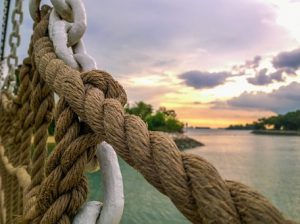 I recall the first time I did an arts activity that woke me up. I was in 4th grade and we were acting like were on a slave ship. We were studying history and the lesson focused on American slave ownership and oppression. There were no children of African descent in my class. This was after all Falmouth, Maine, where the vast majority of residents were white like myself. Why didn’t we just use books? Why didn’t our teacher just tell us that slavery happened, and just describe to us the impact on people of African descent, as well as revealing the painful truth that our country is founded on oppression, hate and ignorance?
I recall the first time I did an arts activity that woke me up. I was in 4th grade and we were acting like were on a slave ship. We were studying history and the lesson focused on American slave ownership and oppression. There were no children of African descent in my class. This was after all Falmouth, Maine, where the vast majority of residents were white like myself. Why didn’t we just use books? Why didn’t our teacher just tell us that slavery happened, and just describe to us the impact on people of African descent, as well as revealing the painful truth that our country is founded on oppression, hate and ignorance?
I swayed back and forth, a “slave” on the ship transported across the sea. The facilitator of the activity was a theatre artist, Gretchen Berg. She was a visiting artist teaching our class, taking the history lesson onto its feet and giving us a way to access the materials – and ourselves in relationship to it – through movement and imagination.
We didn’t have to do history this way. But here we were, lined up along the walls of the classroom in chains, looking out into the ocean, missing our families, not in control of our own destinies, imprisoned. Such was the experience of the people on the boat, such was the reality of the American slave trade, and such was the history being lived out in our minds and hearts. As we rocked on the waves on our way to foreign shores far from home, the power of the story of loss and sadness was palpable within us.
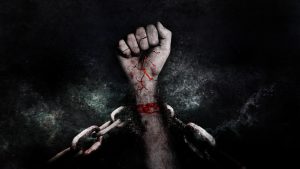 Was this too much for 4th graders? The question really should be this: why would we teach it any other way? I became committed to social justice and theatre in my adult life. I became a teaching artist myself, and an educator for social justice. I worked with my own racial identity, as a white woman living in the United States, and later living on a Sioux reservation in South Dakota. For the first time a racial minority among a community of Dakota Sioux, I developed awareness of my skin color as being part of my experience. This is how others look at me: white. White comes with being given things, getting to assume I will have access, having opportunities to try, show up, express and be free in the world: white. It’s called white privilege. The privilege is to not have to wonder if I was passed over for a job because of my race, or because my name sounded too ethnic. I can shop in stores without a clerk eyeing me to see if I’ll shoplift. I can get an apartment in whatever neighborhood I choose without being screened or denied because of my race.
Was this too much for 4th graders? The question really should be this: why would we teach it any other way? I became committed to social justice and theatre in my adult life. I became a teaching artist myself, and an educator for social justice. I worked with my own racial identity, as a white woman living in the United States, and later living on a Sioux reservation in South Dakota. For the first time a racial minority among a community of Dakota Sioux, I developed awareness of my skin color as being part of my experience. This is how others look at me: white. White comes with being given things, getting to assume I will have access, having opportunities to try, show up, express and be free in the world: white. It’s called white privilege. The privilege is to not have to wonder if I was passed over for a job because of my race, or because my name sounded too ethnic. I can shop in stores without a clerk eyeing me to see if I’ll shoplift. I can get an apartment in whatever neighborhood I choose without being screened or denied because of my race.
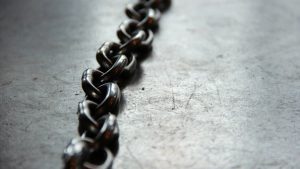 My racial identity extends beyond me into my whole life, beyond the lives of my parents and our lineage into the history of this country. You see, my middle name is Calhoun, which happens to be the last name of one of America’s pro-slavery vice presidents, John C. Calhoun. He was my grandmother’s grandfather’s cousin. I am personally connected to the oppression of slavery, through my blood and family. Seeing my race, my very skin, as being a tool of oppression stirred up white guilt at that being a part of me, beyond my control.
My racial identity extends beyond me into my whole life, beyond the lives of my parents and our lineage into the history of this country. You see, my middle name is Calhoun, which happens to be the last name of one of America’s pro-slavery vice presidents, John C. Calhoun. He was my grandmother’s grandfather’s cousin. I am personally connected to the oppression of slavery, through my blood and family. Seeing my race, my very skin, as being a tool of oppression stirred up white guilt at that being a part of me, beyond my control.
Or was it beyond my control? What if I used my privilege for change? If whiteness works to my advantage, maybe I can leverage it to better society, to further the mission for equality. Start by giving a name to it. White privilege. Racial injustice. I have the opportunity to speak up against racism. Micro-aggressions are the most frequent forms of racism. For example: last month a well-meaning white lady said of the Black Lives Matter movement, “what about ‘all lives matter?’” White folks are killing black folks, and while it’s true all lives matter, saying it this way denigrates the issue of equality and injustice – especially coming from a white person. I feel now it is my responsibility to use the privilege to speak truth to power, to not let aggression and racism pass me by unnoticed. It is my responsibility to help change it.
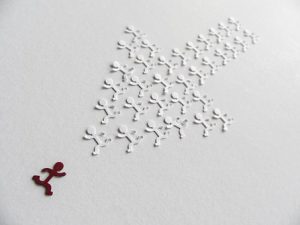 Privilege works on a larger scale than we even know. As an educator, I teach acting and live a social justice mission in my own life. School to me is a place, gratefully, where our students explore questions critically by doing project-based learning and service to others. We can examine the world around us — those who run the country, in politics, law enforcement, schools, the job market and housing market — and discover that the leaders and decision makers are in the vast majority, white. With white students in particular, I use identity work as part of locating ourselves in the social justice world. If our whiteness gives us power in society, based on the luck of the draw, what are the implications? What about folks who aren’t white? How do we understand the world from a place of justice and equality? What is our role?
Privilege works on a larger scale than we even know. As an educator, I teach acting and live a social justice mission in my own life. School to me is a place, gratefully, where our students explore questions critically by doing project-based learning and service to others. We can examine the world around us — those who run the country, in politics, law enforcement, schools, the job market and housing market — and discover that the leaders and decision makers are in the vast majority, white. With white students in particular, I use identity work as part of locating ourselves in the social justice world. If our whiteness gives us power in society, based on the luck of the draw, what are the implications? What about folks who aren’t white? How do we understand the world from a place of justice and equality? What is our role?
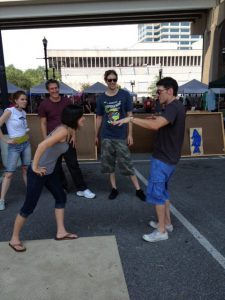 There are many buzz words educators use to describe good education: critical-thinking, hands-on learning, student-centered classroom, and 21st Century skills. As an acting teacher, I educate and inspire students to feel compelled to work on solutions to problems like racism and economic disparity. We create an environment in which we trust the space and each other to explore the life of the character. Who am I? What do I want? What is in my way? Using our bodies and minds. we live out the experience physically in the moment, we explore emotions through scenes like a slave ship or an example of modern day police brutality. We imagine the desire to be free, the real fear of losing our rights and the control over our destiny, of being forced into slavery, or jail, or worse.
There are many buzz words educators use to describe good education: critical-thinking, hands-on learning, student-centered classroom, and 21st Century skills. As an acting teacher, I educate and inspire students to feel compelled to work on solutions to problems like racism and economic disparity. We create an environment in which we trust the space and each other to explore the life of the character. Who am I? What do I want? What is in my way? Using our bodies and minds. we live out the experience physically in the moment, we explore emotions through scenes like a slave ship or an example of modern day police brutality. We imagine the desire to be free, the real fear of losing our rights and the control over our destiny, of being forced into slavery, or jail, or worse.
 You are chained on the boat, pulling hard at the sores on your hands and feet, for days. You are starving because you haven’t eaten. You are desperate because your young child is far away, alone, and you are in the middle of the ocean off to some foreign hell. What this does to the mind and heart is important: to feel what injustice inspires, real, personal learning about compassion and other peoples’ perspectives. We can use this to help us understand our history, what matters about the past, and what still matters today. Most importantly, we can use it to help us understand how we want to live our lives, and who it is we want to become.
You are chained on the boat, pulling hard at the sores on your hands and feet, for days. You are starving because you haven’t eaten. You are desperate because your young child is far away, alone, and you are in the middle of the ocean off to some foreign hell. What this does to the mind and heart is important: to feel what injustice inspires, real, personal learning about compassion and other peoples’ perspectives. We can use this to help us understand our history, what matters about the past, and what still matters today. Most importantly, we can use it to help us understand how we want to live our lives, and who it is we want to become.
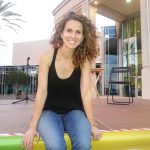 Joanna C Horton is an arts educator with a background in acting. From age 16, she has led in-school theatre workshops about social issues with non-profits companies. She has worked as a professional actor in the eastern U.S. before opening her studio to train actors in Florida. Joanna specializes in teaching the Meisner technique through her organization: artsleadershipintl.org. Joanna received her Master’s degree in Arts Education from Harvard University. She is a Shambhala practitioner, guide, and Assistant Director. Currently, she lives and teaches in Sedona, AZ. For more information, visit joannachorton.com.
Joanna C Horton is an arts educator with a background in acting. From age 16, she has led in-school theatre workshops about social issues with non-profits companies. She has worked as a professional actor in the eastern U.S. before opening her studio to train actors in Florida. Joanna specializes in teaching the Meisner technique through her organization: artsleadershipintl.org. Joanna received her Master’s degree in Arts Education from Harvard University. She is a Shambhala practitioner, guide, and Assistant Director. Currently, she lives and teaches in Sedona, AZ. For more information, visit joannachorton.com.

















May 19, 2016
Reply
Joanna,
Thank you for sharing this story. I’m a Black girl who grew up in Utah, and our education on slavery was brief. Very brief. I can only imagine how I might have been touched by acting something like this out at such a young age. Also, thank you for naming whiteness. I would like to live in a culture were we also feel comfortable to name and see people as the race they are, and that not being a bad thing. So often I’ve heard, “I don’t see you as Black, I see you as Kelsey.” I am Kelsey and I am Black. Not seeing my race is not a compliment or a comfort. I love this quote from Audre Lorde: “It is not our differences that divide us. It is our inability to recognize, accept, and celebrate those differences.” Amen.
May 16, 2016
Reply
Am I permitted to disagree?
You make a number of very strong statements and do not really offer any support other than the anecdotal and emotional. Which, incidentally is why I think it is a bad idea to emotionally manipulate fourth graders in a classroom setting.
The first of those statements “the painful truth that our country is founded on oppression, hate and ignorance” is an incredible oversimplification that ignores the broader historical context and distills millions of years of history coming to a particular point into what amounts to little more than a political slogan.
The concept of white privilege is being pushed by a very small and vocal movement, but fails to meet any reasonable burden of proof. The social justice/identity politics movements are dividing and categorizing people into graded scales of privilege depending on numerous factors, this is only dividing people further.
Here is a very well reasoned explanation of the other point of view from renowned economist Thomas Sowell. http://townhall.com/columnists/thomassowell/2015/05/05/race-politics-and-lies-n1994127
You mentioned the Black Lives matter movement, which has been mentioned in association with Shambhala many times recently. I hope you will take ten minutes to consider a different perspective, this time from a really smart young youtuber who goes by That Guy T. https://www.youtube.com/watch?v=7CCxMN7cGKw
Over the last several months, we, as Shambhalians have been presented with a lot of identity politics, to the point that it seems to have become official policy.
Is this the case? or is there room for some discussion and disagreement?
I believe that we share similar goals.
May 14, 2016
Reply
Joanna,
How delightful to hear what you’re up to, and the trajectory your acting career, and continued involvement in Shambhala has taken!
Be well!
Graciela Marin
May 14, 2016
Reply
Thank you for posting this insightful piece, Joanna. As a white woman who tries to be aware of interracial dynamics, I have far to go in recognizing the extent of the privileges I enjoy purely because of the color of my skin. Your work helps us all.
May 13, 2016
Reply
Thanks for naming whiteness, for using your privilege to shed light on the paradigm of racial hierarchy, a complex system of advantage made up of history, laws, public policies, attitudes, and beliefs. It’s so easily overlooked by those who benefit from it, as you so clearly point out. The cost of the system is not only the dehumanization of people of color but the dehumanization of people (who benefit) when they ignore the pain of racial injustice.
As a Chinese American I find myself neither here nor there. Not being white, I grew up in predominantly white communities as other, experiencing racism and violence against my people, yet I have the privilege of trying to become the “model minority”, to get closer to being white. The cost is cutting myself off from myself, trying to be something I am not.
For me, social justice is a journey of human awakening — waking up to that which divides us, so we can discover the power within us to realize our shared humanity, or tender hearts. In waking up together we make human connections that form the web of good human society — Enlightened Society!
For information about diversity and inclusion efforts in Shambhala see our new webpage http://shambhalaonline.org/diversity-in-shambhala/